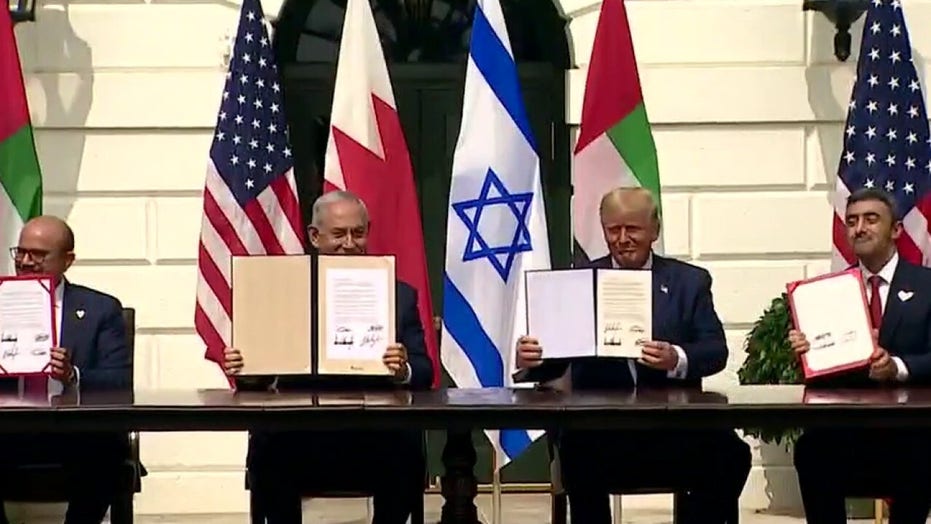Trump's Middle East Trip: Kushner's Unseen Influence

Table of Contents
Kushner's Role in the Abraham Accords
Kushner's involvement in the Abraham Accords, the normalization agreements between Israel and several Arab nations, stands as a prime example of his substantial influence.
Behind-the-Scenes Negotiations
Kushner's involvement went far beyond public appearances. He engaged in extensive, often secret, negotiations with key players across the region.
- Secret Meetings: Meetings took place in various locations, including the White House, undisclosed locations in the Middle East, and even on Kushner's private jet.
- Key Players: Kushner directly engaged with leaders such as Mohammed bin Salman (MBS) of Saudi Arabia, Crown Prince Mohammed bin Zayed of the UAE, and Benjamin Netanyahu of Israel. He cultivated relationships based on personal trust and direct communication, bypassing traditional diplomatic channels.
- Communication Strategies: Kushner's communication style, characterized by a direct and informal approach, was both praised and criticized. His willingness to engage in back-channel diplomacy proved effective in breaking down long-standing barriers to communication.
Impact and Legacy
The Abraham Accords have had a profound impact, leading to:
- Increased Regional Cooperation: Enhanced trade and diplomatic relations between Israel and the signatory nations.
- Shifting Geopolitical Alliances: A realignment of power dynamics within the Middle East, with potential implications for Iran and other regional players.
- Criticisms and Controversies: Critics argue the accords sidelined the Palestinian issue and failed to address the underlying causes of conflict. Some question the long-term sustainability of the agreements. Kushner's role has been viewed as both a catalyst for progress and a source of controversy.
Kushner's Relationship with Key Middle Eastern Leaders
Kushner cultivated close relationships with key Middle Eastern leaders, influencing policy outcomes significantly. His personal connections provided access and a level of trust unavailable through traditional diplomatic channels.
Building Relationships
Kushner's ability to build rapport was crucial:
- Direct Engagement: He focused on personal relationships, fostering trust and understanding through direct, one-on-one interactions.
- MBS Relationship: Kushner's relationship with MBS, though controversial given human rights concerns surrounding the Saudi crown prince, was undeniably influential. Their meetings, both public and private, shaped discussions on various regional issues.
- Netanyahu Relationship: Kushner's strong relationship with Netanyahu facilitated discussions and agreement on several crucial points of the Abraham Accords.
Strategic Partnerships and Alliances
These personal connections translated into strategic partnerships:
- UAE-Israel Relations: Kushner played a critical role in forging closer ties between the UAE and Israel, a landmark shift in regional dynamics.
- Bahrain-Israel Relations: Similar efforts led to the normalization of relations between Bahrain and Israel.
- Potential Risks and Benefits: While these alliances created new opportunities for regional cooperation, concerns remain about the long-term stability and potential downsides of aligning with certain authoritarian regimes.
Criticism and Controversy Surrounding Kushner's Role
Despite his achievements, Kushner's role faced significant criticism.
Lack of Diplomatic Experience
Kushner's lack of formal diplomatic training was often cited as a weakness:
- Naivete Concerns: Critics argued his inexperience could lead to miscalculations and ineffective diplomacy.
- Unconventional Approaches: While his unconventional methods proved successful in some instances, they also raised concerns about the potential for overlooking crucial nuances.
- Counterarguments: Supporters argue his fresh perspective allowed him to bypass bureaucratic obstacles and engage in creative problem-solving.
Potential Conflicts of Interest
Allegations of potential conflicts of interest further clouded Kushner's involvement:
- Family Business Ties: Kushner's family's real estate investments raised concerns about potential conflicts of interest regarding business dealings in the Middle East.
- Financial Transparency: The lack of transparency surrounding his financial dealings intensified criticism.
- Investigations: Although no definitive proof of wrongdoing has emerged, investigations into potential conflicts of interest persist.
Conclusion
Jared Kushner's influence on Trump's Middle East policy, particularly during the pivotal trip in [insert dates], remains a complex and controversial subject. While his role in brokering the Abraham Accords was undeniable, his lack of experience and allegations of potential conflicts of interest raised serious questions. Understanding Kushner's Middle East influence is crucial to comprehending the ongoing complexities of the region's geopolitical landscape. To delve deeper, explore further resources on the Abraham Accords and Kushner's role in shaping US foreign policy in the Middle East. Understanding Kushner’s impact on the region remains vital for comprehending the current political climate.

Featured Posts
-
 John Wick 5 Keanu Reeves Confirms Future Of The Franchise
May 11, 2025
John Wick 5 Keanu Reeves Confirms Future Of The Franchise
May 11, 2025 -
 Ufc 315 Fight Card What To Expect Tonight
May 11, 2025
Ufc 315 Fight Card What To Expect Tonight
May 11, 2025 -
 Skandaliczne Odkrycie Ksiaze Andrzej Na Zabiegu Masazu Calkowicie Rozebrany
May 11, 2025
Skandaliczne Odkrycie Ksiaze Andrzej Na Zabiegu Masazu Calkowicie Rozebrany
May 11, 2025 -
 Top College Town In Michigan City Name S Appeal
May 11, 2025
Top College Town In Michigan City Name S Appeal
May 11, 2025 -
 Rory Mc Ilroys Daughters Golfing Debut At Augusta
May 11, 2025
Rory Mc Ilroys Daughters Golfing Debut At Augusta
May 11, 2025
